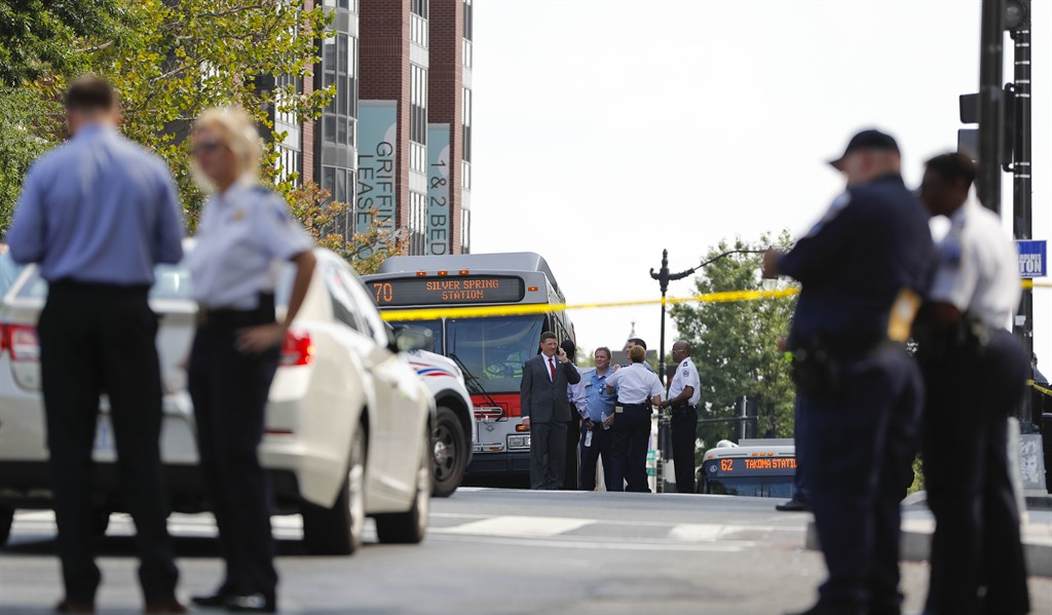According to gun control groups like Everytown, Washington, D.C. has some of the “strongest gun laws in the country,” which should make it one of the safest cities in the U.S.; at least if gun control made any of us safer.
That is most definitely not the case. While D.C.’s violent crime and homicide rates are still down compared to the city’s crime stats in the 1980s and early 1990s (a time when D.C. banned handguns outright, mind you), there were more than 200 homicides last year, and armed robberies and assaults with a deadly weapon both increased as well. Now, some anti-violence activists in the community say it’s time for D.C. to fix its broken criminal justice and mental health systems… and they’re not not calling for any more gun control laws in the name of public safety.
Over two days of emotional testimony from residents, community organizers, and gun violence prevention activists this month, one theme came up again and again: “the system is broken.”
From a dearth of city-run mental health services to unsafe police interactions to disorganized violence prevention efforts, residents from the communities most impacted by gun violence said the government is failing its people – and isn’t listening to what they need.
“I heard the mayor say…’We got a gun violence problem.’ We don’t have a gun violence problem,” said Johnny Howard, a peer support specialist who testified at Saturday’s gun violence prevention roundtable, hosted by Ward 2 Councilmember Brooke Pinto. “We have a people problem…No gun has ever gone to court and got charged. Invest in people.”
Howard wasn’t alone in panning the District’s philosophy of banning and arresting its way to safety. And while there were some activists on hand for the roundtable who object to almost every act of policing, including targeted deterrence, there were also those who say the bigger issue is with the District’s incoherent overall strategy.
The notion that the government’s disorganized response is hindering its violence reduction efforts is not new to D.C. officials. A 2022 strategic plan to reduce gun violence, commissioned by the Criminal Justice Coordinating Council, identified a lack of strategy and coordination between agencies as one of the city’s largest failures. In response, former interim Deputy Mayor for Public Safety and Justice Kevin Donahue said the city was going to hire more violence prevention workers, pay them more, and increase communication between supervising agencies and the violence interrupters working throughout the city.
Another shortcoming of the city’s approach, according to community member Betty Murray, is a lack of mental health resources for the city’s violence interrupters. A mother of four men and founder of the nonprofit group Genuine Sisters Supporting Sisters, Murray works in the Congress Heights community to prevent violence. But she said she often feels unsafe and has been threatened doing that work – adding that the city-run violence intervention programs don’t focus enough on rehabilitating men before sending them back out into a community, where they could be triggered.
“Are we really rehabilitating them before we put them back out in the community?” she asked Saturday. “I have lost respect for so many people in my own community, because so many of these kings came and stood there and watched me be threatened.”
It sounds like there were lots of shortcomings identified by participants, but no one was really calling for more gun control laws. To be fair, it doesn’t sound like any activists complained about the number of gun laws already on the books either. Instead of singling out any particular law for criticism, it was the nature of policing in D.C. that some participants objected to.
The role police should play in the city – and how many officers the city needs – has been a long-standing debate in D.C. Bowser has put millions into ramping up police hiring, and last month, Ward 7 Councilmember Vincent Gray introduced a bill that would increase the size of the police force as MPD sees a two-year decline in officers. Just last week, Ward 8 councilmember Trayon White introduced a bill that would put school resource officers (SROs) back in schools, after the council voted to phase out SROs in 2021. Taylor said the city dollars put towards attracting more officers, could instead be put towards building out better violence prevention efforts on a grass-roots level.
“We have to be honest about how relying on the police to address violence facilitates the ongoing criminalization, brutalization and killing of Black people,” Taylor said. “And how we rely on the police, demanding more police presence, more aggressive police, does not make us safer and does not make us feel safer…you can’t police your way out of gun violence.”
Not by turning the right to keep and bear arms into a litany of non-violent, possessory criminal offenses anyway. Unlike Nee Nee Taylor, I think there’s a great deal of value in tactics like targeted deterrence and programs like Operation Ceasefire, which provide both community support for those trying to escape gang violence and the promise of prosecution without plea bargains for those who don’t take advantage of the opportunity to turn their lives around. These tactics typically lead to fewer overall arrests while substantially reducing homicides and non-fatal shootings by focusing on the most prolific and violent offenders in any given neighborhood.
I’m guessing that Taylor and I would have plenty of disagreements on how to address D.C.’s crime woes, but it sounds like we’re in agreement that new gun laws enforced by the Metropolitan Police Department isn’t the answer. As Johnny Howard said, this is ultimately a people problem, which means there is no anti-gun “solution” that’s going to fix it.









